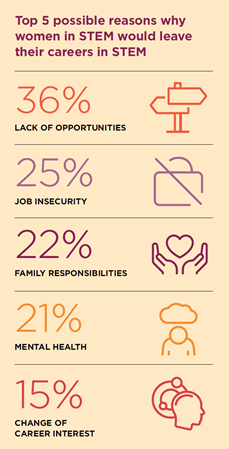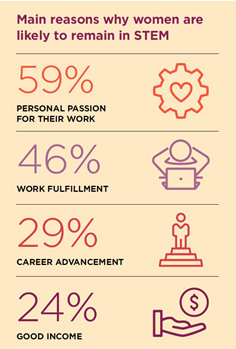New report: COVID-19 has exacerbated gender inequity in the STEM workforce across the Asia-Pacific
- 3 mins read


A new report launched today by the Australian Academy of Science has found that the impact of COVID-19 on women in the STEM workforce across the Asia-Pacific region has heightened the challenges and barriers they face in progressing their careers.
A survey conducted as part of the report found almost half of the women surveyed with caring responsibilities do not have access to flexible work, despite 60% of them saying flexible arrangements could better support their working conditions.
The survey included responses from 1109 individuals, including 865 women, from 31 Asia-Pacific countries and economies. This survey provides new evidence of the extent and impact that COVID-19 has had on the STEM workforce across the region.

Top five possible reasons why women in STEM would leave their careers in STEM
The report calls for STEM-related organisations across the Asia-Pacific to embed more flexible workplace cultures and to recognise that for those working in STEM research, flexible measures of work productivity are needed, especially in terms of publication records.
The worsening of gender inequity in the STEM workforce across the region has been brought about by changes in lifestyle and the blurring of boundaries between the spheres of work and home, along with increased domestic and caring responsibilities.

Main reasons why women are likely to remain in STEM
The report found the pandemic has also impeded work productivity, increased precarious and insecure work arrangements, and reduced access to research facilities and workplaces due to lockdown arrangements.
These new conditions have had a significant impact on individual wellbeing, with the survey finding 50% of survey respondents reporting negative mental health impacts in relation to work or home life.
Despite the impacts of the pandemic, the survey found personal passion for their work (59%) and work fulfillment (46%) are the main reasons why women are likely to remain in STEM. 72% reported that their short-term career expectations were to remain in the STEM workforce.
Chair of the report’s Steering Committee, Emeritus Professor Cheryl Praeger, said the report has revealed that the pandemic continues to profoundly affect the lives and day-to-day activities of women in the STEM workforce at every level.
“Different parts of the Asia-Pacific region have different capacities to respond to these negative impacts. Regional collaboration, together with supportive workplaces and communities, can minimise gendered impacts of the pandemic on the STEM workforce.
“Solutions are offered in the report for all parts of STEM, particularly the need for flexibility in workplaces for all genders, and flexibility in grant applications and delivery,” Emeritus Professor Praeger said.
The report also highlights 20 personal stories from nine Asia-Pacific countries and looks at ways the region can future-proof and enhance a diverse STEM workforce in the Asia-Pacific.
This project was funded by the Regional Collaborations Programme, administered by the Australian Government’s Department of Industry, Science, Energy and Resources (DISER).
About the survey
A wide range of STEM disciplines and all career stages were represented in the survey responses. Women in chemistry were the biggest group (13%), followed by women in physics and mathematics (12%), and biology (11%). More than 80% of all respondents had attained post-graduate qualification. Women aged 35 to 44 years (37%) were the main age group who completed the survey. Just over 25% of the survey respondents were from Australia. The countries of survey respondents are on page 16 of the report.
Online event—13 July
A free online event was held on 13 July with Professor Cheryl Praeger outlining the research project’s key findings. A panel discussion followed hosted by Australia’s Women in STEM Ambassador Professor Lisa Harvey-Smith and featuring the following STEM experts: Dr Judith Zubieta (National Autonomous University of Mexico), Hazami Habib (CEO Academy of Science Malaysia) and Professor Patricio Felmer (University of Chile). Watch the recording of this event.





